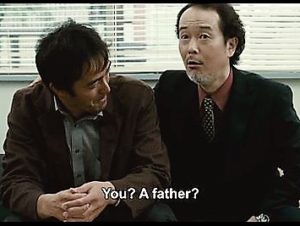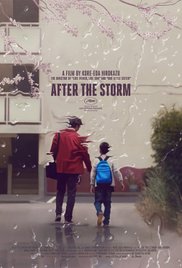After the Storm [Umi yori mo mada fukaku] **** (2016, Hiroshi Abe, Yôko Maki, Satomi Kobayashi) – Movie Review
Writer-director Hirokazu Koreeda’s sweet and tender Japanese slice-of-life family relationships drama is a quiet, subtle little gem, slow burning, smouldering, but brightly burning. Gentle, kind, wise and forgiving, this effortlessly achieved humanist film gains its power from being layered, nuanced and hauntingly bitter-sweet.
Hiroshi Abe stars as the middle aged failure Shinoda Ryôta, once a prize-winning author, now working as a private detective for inspiration for a new book. He wastes his money on gambling and struggles to find money to pay child support. He’s offered a job writing the text for a manga. He needs the money but somehow thinks it’s beneath him.
Coming to terms with the death of his father, he also struggles to reconnect with his elderly mother (Kirin Kiki), beautiful ex-wife (Yoko Make) and eager young son (Taiyo Yoshizawa). His third struggle is to try to find his place in life. Is it all too late or will one stormy summer night sort everything out?
You think we wouldn’t care for Ryôta very much, would you? But Koreeda gets on in there and makes us care, and so does Hiroshi Abe, who does rabbit in headlights beautifully. Kirin Kiki, Yoko Make and Taiyo Yoshizawa are perfect also. The role of the none-too-nice seeming ex-wife is tricky, but Kirin Kiki makes it work, thawing out subtly, little by little, and then, well perhaps not.
It’s not much of a plot for two hours, but Koreeda’s film has everything it needs and more. Of course, nothing much happens, but also then everything happens. Koreeda has no gunplay or CGI to bail him out, so he just relies on his skills. They prove masterly.
Most of the time, it feels so ‘real’ that you could be watching a documentary. The writing and acting are flawless. Koreeda’s film is deceptive. It seems to be fragile but it is very strong. It seems to be miniaturist, but it is dealing with all the big issues – past, present, future, life, death, hopes, wishes, dreams and family ties. It is all here in this Storm in a teacup.
The summer night storm, the missing lottery tickets, the detective agency, the playground chute – they are all played for real, but they are all symbolic too. The dialogue is ‘real’ too, but also literary, even theatrical. You could put Koreeda’s script on a theatre stage with very few adjustments. Yet it seems totally filmic, total cinema.
It is that rare kind of film that wins major international awards – but it didn’t win any. It was nominated at Cannes for Un Certain Regard Award – sorry that’s a bit of an insult. The American Online Film Critics Society Awards 2017 voted it Best Non-U.S. Release. So Online Film Critics have their uses.
© Derek Winnert 2017 Movie Review
Check out more reviews on http://derekwinnert.com



